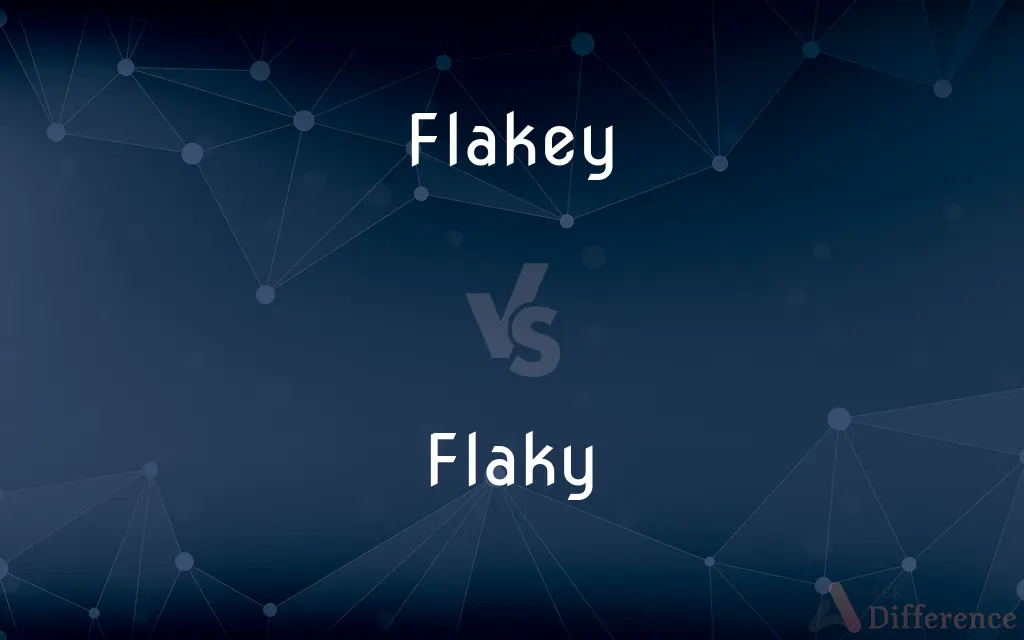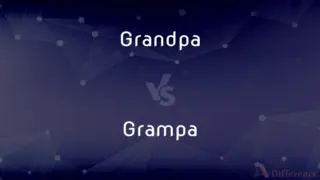Flakey vs. Flaky — What's the Difference?
By Urooj Arif & Maham Liaqat — Updated on April 26, 2024
"Flakey" and "flaky" are variants of the same adjective, primarily describing something that peels off easily; "flaky" is the preferred and more common spelling.

Difference Between Flakey and Flaky
Table of Contents
ADVERTISEMENT
Key Differences
"Flakey," though less commonly used, refers to the characteristic of breaking into flakes or being easily crumbled. "Flaky," on the other hand, is the dominant form used in contemporary English to describe similar characteristics.
When describing pastries, "flakey" might still appear in recipes or descriptions, emphasizing a delicate, layered texture. "Flaky," however, is more likely to be seen in both culinary and general contexts, suggesting a light and airy structure.
In terms of reliability, "flakey" can describe someone who is unreliable or inconsistent. "Flaky," whereas, is the more standard term to depict a person whose behavior is unpredictable or unreliable.
The use of "flakey" in older texts can reflect historical spelling variations. "Flaky" is now standard in modern texts, aligning with the evolution of language and standardized spelling.
In digital communication, especially in informal texts or emails, "flaky" is predominantly used to maintain clarity and adherence to modern spelling norms, while "flakey" might appear as a stylistic choice or in error.
ADVERTISEMENT
Comparison Chart
Common Usage
Less common
More commonly used
Spelling Preference
Older or less preferred
Modern and preferred
Contexts
Historical texts
Modern, general contexts
Implication in Texts
Can indicate older usage
Indicates contemporary usage
Perception
Might be seen as a typo
Viewed as correct spelling
Compare with Definitions
Flakey
Occasionally used in older literary works.
In the classic novel, her flakey demeanor was evident.
Flaky
Refers to something that flakes easily.
The crust of the pie was perfectly flaky.
Flakey
Referring to an unreliable person.
He was flakey and often canceled plans last minute.
Flaky
Predominantly seen in modern writing.
His flaky response was frustrating but expected.
Flakey
Describes a light, layered texture in food.
The croissant was deliciously flakey.
Flaky
Considered the correct contemporary spelling.
Make sure to spell it as flaky in your report.
Flakey
Relating to breaking into small, thin pieces.
The old paint on the wall was flakey and peeling.
Flaky
Commonly used to describe pastry textures.
Everyone complimented the flaky texture of the biscuits.
Flakey
Sometimes perceived as an incorrect spelling.
The sign spelled it flakey which seemed outdated.
Flaky
Indicates unpredictability in behavior.
She’s fun but a bit flaky when it comes to commitments.
Flakey
Made of or resembling flakes.
Flaky
Made of or resembling flakes.
Flakey
Forming or tending to form flakes or thin, crisp fragments
Flaky pastry.
Flaky
Forming or tending to form flakes or thin, crisp fragments
Flaky pastry.
Flakey
Undependable, as in keeping social engagements
A flaky friend who is always late.
Flaky
Undependable, as in keeping social engagements
A flaky friend who is always late.
Flakey
Somewhat eccentric; odd
"that slightly flakey quality, in joy as well as in grief, that prepares us subtly for the mad scenes to come" (Village Voice).
Flaky
Somewhat eccentric; odd
"that slightly flakey quality, in joy as well as in grief, that prepares us subtly for the mad scenes to come" (Village Voice).
Flakey
Alternative spelling of flaky
Flaky
Consisting of flakes or of small, loose masses; lying, or cleaving off, in flakes or layers; flakelike.
Flakey
Made of or easily forming flakes
Flaky
Unreliable; likely to make plans with others but then abandon those plans.
Flaky
Unreliable; working only on an intermittent basis; likely due to malfunction.
I cannot enjoy the online game because of my flaky Internet connection.
Flaky
Consisting of flakes or of small, loose masses; lying, or cleaving off, in flakes or layers; flakelike.
What showers of mortal hail, what flaky fires!
A flaky weight of winter's purest snows.
Flaky
Prone to strange or erratic behavior; - of persons.
Flaky
Odd, unpredictable or unconventional; offbeat; whacky; - of behavior.
Flaky
Unpredictable, erratic, or unreliable; - of machinery, especially electronic devices.
Flaky
Made of or easily forming flakes
Flaky
Conspicuously or grossly unconventional or unusual;
Restaurants of bizarre design--one like a hat, another like a rabbit
Famed for his eccentric spelling
A freakish combination of styles
His off-the-wall antics
The outlandish clothes of teenagers
Outre and affected stage antics
Common Curiosities
What is the most common spelling between "flakey" and "flaky"?
"Flaky" is the more common and accepted spelling.
Is "flaky" only used to describe food?
No, "flaky" can describe anything that easily flakes apart or someone unreliable.
Is "flakey" considered incorrect?
While not strictly incorrect, "flakey" is less standard than "flaky".
Can "flakey" and "flaky" be used interchangeably?
Yes, they can be, as they are variants of the same word, though "flaky" is preferred.
Why do some people still use "flakey"?
Some might use it out of habit, or in certain artistic or historical contexts.
How should one choose between "flakey" and "flaky" when writing professionally?
It is advisable to use "flaky" in professional writing to align with standard spelling practices and avoid perceptions of error.
What is the origin of the adjective "flaky"?
"Flaky" derives from the noun "flake," implying something that comes off in layers or pieces, with the suffix -y indicating a characteristic quality.
Can the use of "flakey" in a document affect its perceived professionalism?
Yes, using "flakey" may be viewed as a spelling mistake or an outdated form, potentially impacting the document's perceived professionalism.
Are there any industries or professions that prefer one spelling over the other?
The culinary and publishing industries predominantly prefer "flaky," particularly in recipes and editorial content.
Are younger generations more likely to use "flaky" over "flakey"?
Yes, younger generations are more likely to use "flaky," reflecting current educational standards and media influences.
How does the spelling "flaky" impact the meaning of a sentence compared to "flakey"?
The meaning generally remains the same; however, "flaky" is more likely to be accepted and understood as the correct form in contemporary usage.
Is there a regional preference for the spelling "flaky" versus "flakey"?
In most English-speaking regions, including the United States and the United Kingdom, "flaky" is the preferred and recognized spelling.
Do dictionaries recognize both "flakey" and "flaky"?
Most modern dictionaries recognize "flaky" as the primary entry, with "flakey" often noted as a less common variant.
How does the usage of "flaky" in digital communication compare to "flakey"?
In digital communication, "flaky" is overwhelmingly more common and accepted, especially in texts and emails.
Has the preference for "flaky" over "flakey" changed over time?
Yes, over time, "flaky" has become increasingly favored due to standardization efforts in education and publishing, making "flakey" much less common.
Share Your Discovery

Previous Comparison
Dominant vs. Predominant
Next Comparison
Grandpa vs. GrampaAuthor Spotlight
Written by
Urooj ArifUrooj is a skilled content writer at Ask Difference, known for her exceptional ability to simplify complex topics into engaging and informative content. With a passion for research and a flair for clear, concise writing, she consistently delivers articles that resonate with our diverse audience.
Co-written by
Maham Liaqat












































